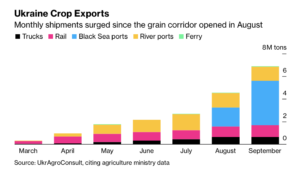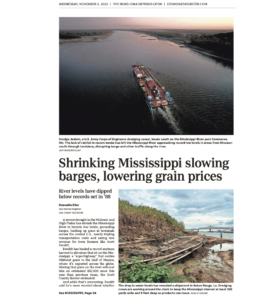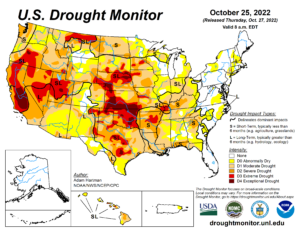China, the world’s largest soybean importer, has ramped up orders for Brazilian cargoes of the oilseed after meeting an initial shipment volume from the US as part of a trade…
Russia to Rejoin Black Sea Export Deal, as Mississippi River Water Level Concerns Persist
Financial Times writers Ayla Jean Yackley and Max Seddon reported today that, “Grain shipments from Ukraine will resume on Wednesday after Russia agreed to rejoin a UN-backed initiative to allow their export, ending a stand-off that threatened to reignite a global food crisis.
“Turkey’s president Recep Tayyip Erdoğan said Sergei Shoigu, the Russian defence minister, had phoned his Turkish counterpart to say Moscow was back on board.”
I welcome the return of the Russian Federation to the implementation of the #BlackSeaGrainInitiative to facilitate exports of food and fertilizer from #Ukraine. Grateful for the Turkish facilitation. Looking forward to working again with all parties in the Initiative.
— Amir M. Abdulla (@AmirMAbdulla) November 2, 2022
The FT writers explained that, “Erdoğan, who has maintained close ties with Vladimir Putin since Moscow launched its invasion of Ukraine and helped broker the original grain deal in July, said Putin told him he would like to see ‘the poorest countries of Africa’ benefit first.
“The next shipments of grains will head to Somalia, Djibouti and Sudan, countries particularly vulnerable without Ukrainian agricultural imports, the Turkish president added.”

“After Turkey’s announcement wheat futures traded in Chicago fell 6 per cent to $8.68 a bushel, while corn dipped 1.7 per cent to $6.86 a bushel,” the FT article said.
Reuters writers Ali Kucukgocmen and Jonathan Landay reported today that, “Russia said on Wednesday it would resume its participation in a deal to free up vital grain exports from war-torn Ukraine after suspending it over the weekend in a move that had threatened to exacerbate hunger across the world.
“The Russian defence ministry said it had received written guarantees from Kyiv not to use the Black Sea grain corridor for military operations against Russia.”
The Reuters article added that, “Turkish President Tayyip Erdogan said earlier that Russian Defence Minister Sergei Shoigu had told his Turkish counterpart that the July 22 grain deal brokered by Turkey and the United Nations would continue to operate as of midday on Wednesday.
“‘The grain transports will continue as agreed before as of 12 (pm) today,’ Erdogan said.”
Also today, Bloomberg writers Aine Quinn and Firat Kozok reported that, “Wheat prices plunged after Russia agreed to resume the deal allowing safe passage of Ukrainian crop exports, reversing a weekend announcement that sowed chaos through agricultural markets and sent prices soaring.”
“Chicago wheat futures plunged as much as 6.3%, after surging in the first two days of the week. Grain prices have been volatile over the past few months amid speculation over the fate of the deal which was set to be renewed in mid-November,” the Bloomberg article said.
And Wall Street Journal writer Jared Malsin reported today that, “Russia said it would resume participation in a deal to allow Ukrainian grain exports, ending a dayslong standoff that threatened the steady flow of such shipments to world markets.
“Grain markets fell after Russia’s move. Wheat was down more than 5% early Wednesday, while corn prices lost more than 1%.”
Meanwhile, Donnelle Eller reported on the front page of today’s Des Moines Register that,
A severe drought in the Midwest and High Plains has shrunk the Mississippi River to historic low levels, grounding barges, backing up grain at terminals across the central U.S., nearly tripling transportation costs and eating into revenue for Iowa farmers like Scott Ewoldt.
“Ewoldt has hauled a record soybean harvest to elevators that sit on the Mississippi, a ‘superhighway’ that carries Midwest grain to the Gulf of Mexico, where it’s exported across the globe. Moving that grain on the river will cost him an estimated $12,000 more this year than previous years, the Scott County farmer estimated.
“And while that’s concerning, Ewoldt said he’s more worried about whether fertilizer will be able to come up the choked river this year and next spring.”

Eller explained that, “The Mississippi River’s watershed is massive, the fourth-largest in the world, pulling from about 40% of the continental U.S., the National Park Service says. Much of it is in drought: About half of the Midwest and nearly 75% of the High Plains is experiencing moderate to exceptional drought, the U.S. Drought Monitor shows. About 80% of the South, with part of its watershed flowing to the Mississippi, also is in drought.
“‘All of those areas are experiencing some levels of drought,’ said Dennis Todey, director of the U.S. Department of Agriculture’s Midwest Climate Hub in Ames. ‘So there’s not much contributing to the Mississippi River.'”
Rises from the middle Mississippi River continue to move downstream and stages will continue to be elevated compared to early last week. River conditions will continue to be near or above 2012 levels for the next several weeks. pic.twitter.com/toWRKm5kMN
— NWS LMRFC (@NWSLMRFC) October 31, 2022
Today’s article added that, “Big grain companies like Cargill Inc. and CHS Inc. say they continue to move grain from Iowa and Midwest farmers. But CHS, a large Minneapolis-area cooperative, said it takes twice as long to transport grain from St. Louis to New Orleans.
“‘Overloaded barges, boats trapped in the queue, and intermittent river closures are causing a significant slowdown,’ said CHS spokesman Patrick Stumpf in an email.

“The river turmoil occurs as the nation’s railroad unions could decide to strike as early as this month, despite a Biden administration brokered labor agreement, announced in September. So far, two of 12 railroad labor unions have rejected the offer, concerned about the rail companies’ sick leave policy.”





